- Home
- Iain Pears
Stone's Fall Page 21
Stone's Fall Read online
Page 21
I tried to protest and say nothing of the sort but, in essence, it was an accurate summary.
“As I say, you know nothing of me. I have a long name of impeccable lineage but that covers a multitude of things. Hungarian aristocrats are not necessarily wealthy or pampered. I was neither. John could not send one of his people to get close to this group; they would have been spotted easily. These payments were coming from inside his companies, and so he felt unwilling to trust anyone connected with them. He needed someone who could be convincing, and whom he could trust. He did not for a moment think of using me.
“I decided to do it. I go to Baden for the waters every autumn—indulgent of me, I know, but I find it pleasant to talk German again—and when I was there I began to read about anarchism and Marxism and revolutionary politics—very interesting, by the way. Then I borrowed the identity of a German revolutionary whom the German police had executed in secret. An accidental fall down the stairs. It was convenient for them—and lucrative—to let it be known that she had been released and had gone into exile. Xanthos organised it for me; I suppose money changed hands in his usual fashion. I studied the clothes and the mannerisms, the way of talking. I went on to Hamburg, then travelled back on a tramp steamer to London. I arrived as Jenny the Red, brutal, uncompromising, more ardent than most men. I got to know these people and they slowly began to trust me in a way they would never have done a man, or someone English. No one John could have found would have been anywhere near as convincing.”
I gaped, at her story and the pride with which she told it. It was so astounding it was ridiculous. It was all very well to lay claim to a hard and poor childhood, with nothing but a book of genealogy to burn for winter warmth, but I still did not easily credit it.
“Your husband allowed you to do this?”
“No. He expressly forbade it.”
“So…”
“Nobody gives me orders, Mr. Braddock,” she said, sounding not a little like Jenny the Red. “Certainly not John. When I proposed the idea, it was only a lighthearted suggestion. His opposition made me determined to see if it could be done. We were quite often apart; an absence of a couple of months was quite simple. I was established in my new identity well before he even discovered that I had gone against his wishes and, as I had been successful and was determined to continue whatever he said, there wasn’t a great deal he could do except accept my help.”
“But why did you want to?”
She shrugged. “Because.”
“Because what?”
“I wanted to. Perhaps I was a little bored. I will get little sympathy from you if I say that the life I lead has its dull side.”
“None at all.”
“But it does, nonetheless. Most of the people I know are content to while away their lives playing bridge and going to house parties. I have little taste for such things, which is why I have to go to Paris or Italy for stimulation. John generally understood and let me come and go as I pleased. He let me do this for him, however reluctantly, because he trusted me and knew he could not stop me. I was never really able to do much to help him, beyond the things you do as a wife.”
I shook my head, to try and knock all the contradictory thoughts out of it so we could get on. So, Elizabeth, Lady Ravenscliff, née Countess Elizabeth Hadik-Barkoczy von Futak uns Szala, transformed herself into Jenny the Red, revolutionary anarchist of Frankfurt. Repeat that sentence and see how easily you believe it. Then you will grasp my difficulties.
“Let us say, just for a moment, that I find all this credible,” I said, “which I don’t. What did you discover?”
“I discovered, in brief,” she said, evidently amused, “that Jan the Builder was part of this group which called itself the International Brotherhood of Socialists, who are, in fact, little more than criminals. Fanatical, of course; they are deeply embittered about the fate of their country, which doesn’t exist at the moment. But they use their anger to justify whatever they want to do, and that includes murder, robbery and extortion. They are violent, suspicious and, for the most part, not very intelligent. Only Jan is clever, but he is also the most violent of them all. He mixes his ardour with cunning and ruthlessness. He is quite a magnetic character. Women fall all over him.”
“Including Jenny?”
“That is not any of your business,” she said quietly. “You will have to believe whatever you think is most likely.”
I blushed to the top of my ears with embarrassment. The woman had successfully thrown me into turmoil yet again. She could do it so easily, and there was nothing I could do to defend myself. I even think I must have derived some pleasure from being so tormented; certainly I put myself into that position often enough.
“What else?” I asked.
“I discovered that the money had been coming through regularly, that it was for a reason, and as long as it kept on arriving, they were content not to launch any expropriations. That is to say, they did not bother themselves with robbing jewellers’ shops, or murdering people. They do, however, have a formidable stock of weapons. I have been to target practise with them on Romney Marshes.”
“Pheasant?” I said hopefully.
“No. People. Not real ones, though.”
“Don’t sound so disappointed. Is this blackmail? Payments to stop them launching some operation against one of your husband’s companies?”
“I have not yet found out. Only Jan knows and he will not say. I have tried to persuade him, but I risk his suspicion if I press too hard. That is why I still go, despite John’s death. I believe I am getting close to discovering what all this is about, and having come so far, I will not give up now.”
I tried, but failed, to erase from my mind all thoughts of how she might try to persuade him. And I confess here—I am deeply ashamed—that I found those thoughts irresistible, exciting, rather than disgusting as they should be. Nor did I find I could reject them as absurd as easily as I should.
“That was my contribution, and John was burrowing into the finances to figure out who was sending the money. He had not told anyone else. That was his worry.”
“What do you mean?”
“He thought he had created a monster. That his companies had come to life, and were acting on their own. That they no longer responded to his orders, but followed their own instincts. That was why he told no one. He did not know who he could tell.”
“I think he may have discovered what it was all about,” I replied. “He was due to have a meeting with Xanthos about it. But he died instead.”
“I only saw him briefly, for a few hours when he came back, and we didn’t have time to talk very much. I was away for the weekend. At the Rothschilds’ at Waddesdon. Charming people. Do you know them? They were not John’s bankers, but they are such congenial company. You’d like them.”
She’d done it again. As fast as I settled into talking to one person, she shifted and became someone else. From the grieving widow, bored with English mores, to the critical, snobbish woman who had been so cruel to Mrs. Vincotti, to Jenny the anarchist, to the lustful woman who had driven me to a pitch of frustration, and now to the society gadabout. Do you know Natty Rothschild, darling? Such a sweet man… Of course I didn’t know the Rothschilds, and I was sure I wouldn’t find them charming at all. I felt as though I was talking to an actress who was playing several roles at the same time, all from different plays.
I glared at her; it was the best I could manage, as an explanation for the feelings behind it would have taken too long, and said too much. Besides, I’m sure she knew exactly what I was feeling.
“I think the obvious thing to do is to go to Northumberland myself and see if I can discover what he did. I will go tomorrow. It is something I can do well, and it will be pleasant to feel competent for once.”
“Do you want me to come as well?” she asked.
Great fantasies swept through my mind at the very idea and, for the first time, I was ready for them. I shook my head. “No. Absolutely not.”
CHAPTER 22
I went the next evening, on the night sleeper to Newcastle, leaving from King’s Cross at ten-fifteen. I had never been on a sleeper before, and I found myself childishly excited by the adventure. Not only that, I went first-class; money was no object so I thought I would indulge myself. My expenses were being met, and I now had (so the bank had informed me in a handwritten letter) £36 14s 6d in my account. I was tired, which perversely spoiled the occasion; I would gladly have stayed up all night in the crisp linen sheets, listening to the rattle of the wheels and seeing the sparks from the chimney fly past the window in the darkness like a private fireworks display. It was a two-berth compartment—I was not sufficiently used to my new status to buy myself a single—and my travelling companion was a solicitor from Berwick, a middle-aged man with a wife and four children, whose father, and father’s father, had been solicitors in Berwick before him. We talked over the brandy that the Great Northern provided before bedtime, served on a mahogany tray brought round by the porter, and I found his conversation soothing and congenial.
He was a happy man, was Mr. Jordan, who had created an entire universe of society in his little town on the edge of the country. On other occasions I might have found him dull, I suppose; his life of bridge and supper parties would never have suited me. But I took comfort in the fact that he liked it; and found my liking was tinged with longing. I feared for Mr. Jordan; I felt that the anarchists and the Ravenscliffs would succeed in sweeping all away, sooner or later, and the world would be the poorer for its loss. And then I slept, the sort of sleep which is entirely perfect. It was glorious and I remember thinking as I was in the deepest part of my unconsciousness that if death bore any resemblance to this, then there was nothing to fear at all.
When I woke up, the sun was shining weakly, and the porter of the night before—freshly shaved and tidy—was gently prodding me. “Morning tea, sir? Toast? Your newspaper? Hot water is on the shelf waiting for you. There’s no hurry at all, sir, but if you could be up and about in an hour…”
My travelling companion had already gone, so I had the compartment to myself, and I made best use of it. The sleeping car had been uncoupled and pushed into a siding, where it was quiet except for the twittering of the birds and the occasional noise of a steam train passing. It was a lovely day, all the better for the fact that what I was doing there stayed out of my mind completely as I drank my tea, read the newspaper, shaved and dressed in the leisurely fashion I decided that men of means must always employ.
I tipped the porter generously then walked peacefully out of the station, and into the middle of Newcastle. The air seemed heavier; the smell of coal hung in the air in a way I had not noticed in the compartment. The buildings were black with decades of soot from the air, every single one of them, and the architecture was grim and foreboding. There was none of the bright stucco of west London, grimy though that often was, few trees, and even fewer people on the streets. Only the deliverymen and a few people on bicycles were to be seen. Newcastle was a working town, a workingman’s town, and it was currently at work. I looked at the scene for a few moments, my bag in my hand, and decided there was no great rush. I was a man of business. That was why I was dressed in my best suit, my funeral and wedding suit, which I had changed into before I left. It was damnedly uncomfortable, but that served a purpose. It reminded me of my task and my role.
I behaved as I thought I should behave, and walked into the Royal Station Hotel just over the way and took a room for the night. Then spent the next hour unpacking and lying on the bed, wallowing in the opulence and comfort. I had never stayed in a hotel before. Not a proper hotel like this one. On the rare occasions I had travelled I had stayed in boardinghouses which rented rooms by the night, the sorts of place which were always cheap, sometimes clean and generally run by people like my own landlady in London. This was altogether different, and I took my time to get used to the room and to the lobby, then spied out the restaurant. It wasn’t that hard, I decided. If Elizabeth could pretend to be a German anarchist, I could masquerade as a member of the professional middle classes for a few hours.
Then I was ready. I asked for a cab to be summoned, and directed it to the Beswick plant, where I was to meet Mr. Williams, the general manager. I will sketch over most of my conversations, as they were not of great significance. I had sent a telegram the day before, saying I had been retained by the executors of the Ravenscliff estate to sort out certain matters regarding the will. I let it be thought that I was a lawyer, as it would have been far too easy to discover my ignorance had I pretended to be anything else. Even with this disguise there were moments of awkwardness, as Mr. Williams knew very much more about company law than I did. He was a grim, tight little man at first sight, and did not relish his time being wasted. Only as our conversation progressed did I realise there was very much more to him. He was an interesting character, in fact, and his initial caution derived principally from the fact that he detested people like me, or rather people like I was supposed to be. Londoners. Moneymen. Lawyers. With no understanding of industry and no sympathy for it. Williams had more in common with the artisans in his yards than he had with the bankers of the City, although both gave him grief. He was an intermediary, beset on all sides.
I won him over eventually. I confessed that I knew nothing of the City whatsoever, told him of my own antecedents surrounded by the bicycle shops of the Midlands, made myself out as much as possible to be more like him than the bankers of his imagination and experience. And eventually he relaxed, and began to talk more freely. “Why are you here, exactly?”
I did my best to look a touch shamefaced. “It is completely foolish,” I said. “But the law requires that the executors confirm the existence of assets in the estate. That is, if the deceased leaves a pair of cufflinks to a friend, then the executor must confirm the existence of those cufflinks. I am here merely to confirm that this shipyard exists. I take it that it does? It is not a figment of the imagination? We are not making some error here?”
Mr. Williams smiled. “It does. And, as the law is a demanding beast, I will show it to you, if you wish.”
“I would like that very much,” I said with enthusiasm. “I would be fascinated.”
He pulled out his watch and glanced at it, then sighed like a man who can see his day being wasted and stood up. “Come along then. I normally do my rounds at lunchtime, but there is no reason why I should not vary my routine a little.”
“Your rounds?” I asked as we left the office, Williams having told his clerks where he was going. “You sound like a surgeon.”
“It is the same idea, in some ways,” he replied. “It is important to be seen, and to take the mood of the place. We have to do more and more of that, as so many of our people now join unions.”
“Does that annoy you?”
He shrugged. “If I were them, I’d join a union,” he said, “even though it makes my life more complicated. But I have always done this. His Lordship thinks—thought, I should say—that it is important.”
“Did you know him well?” I asked. “I never met him. He sounds an interesting man.”
“He was very much more than that,” Williams said, “but he will never be recognised as such. Actresses are better known than men of industry, even though the latter generate the wealth which keeps us from poverty.”
“So what was so great about him?”
Williams looked at me thoughtfully, then said, “Come this way.”
He took me through a doorway, along a corridor, then up a flight of stairs, then another, and another, and another. He flitted up nimbly enough, I puffed behind in the dark, wondering where we were going, until he reached another door, opened it and stepped out into the bright sunlight. “This is what was so great about him,” he said as I stepped through.
It was breathtaking, a sight such as I had never seen before, never even imagined. I knew, all schoolboys knew, about British industry. How it led the world. We knew about the ris
e of the factory, and mass production. Of iron mills and cotton mills and railways. And daily we saw the results: Sheffield steel, railway engines from Carlisle, ships built in dozens of yards all around the country. We saw the iron girders of bridges, visited the Crystal Palace and knew all about the other marvels of the age. How such things came to be was rarely taught to people like me. They merely existed. I had only ever seen the outside of factories, and there were few enough of those in London, and certainly nothing of any great scale. Even in my hometown the biggest employer, the Starley Meteor Works, only had a couple of hundred people.
I stared in utter amazement, and with emotions verging on awe. The yard was gigantic, so big you could not see the end of it, whichever way you turned, it was simply swallowed up in the haze of sunlight through smoke. A vast mass of machinery, cranes, yards, buildings, storage areas, assembly sheds, offices, stretching out before my eyes in every direction. Plumes of thick black smoke rose from a dozen chimneys, the clanking, thudding, scraping and screeching of machinery came from different parts of the scene. It seemed chaotic, even diabolical, the way the landscape had disappeared under the hand of man, but there was also something extraordinarily beautiful in the intricacy, the blocks of brick buildings set against the tin roofs and rusting girders and the dark brown of the river, faintly in view to the east. And there was not a tree, not a bird, not even a patch of grass, anywhere to be seen. Nature had been abolished.
“This is the Beswick Shipyard,” Williams said. “The creation of Lord Ravenscliff, more than anyone else. It is only one part of his interests; he reproduced factories like this across the country, and across Europe, although this is by far the biggest. What you see is not a factory, it is a sequence of factories, each one carefully linked to the other parts, and this, in turn, is linked to the other sites across the Continent. It is the most complex, elaborate structure that mankind has ever constructed.”

 The Dream of Scipio
The Dream of Scipio Stone's Fall
Stone's Fall The Last Judgement
The Last Judgement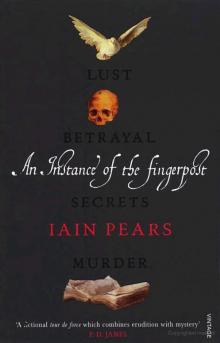 An Instance of the Fingerpost
An Instance of the Fingerpost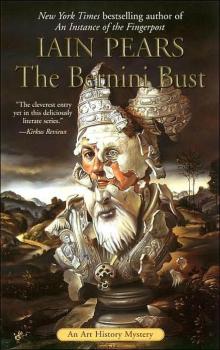 The Bernini Bust
The Bernini Bust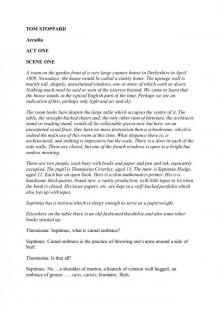 Arcadia
Arcadia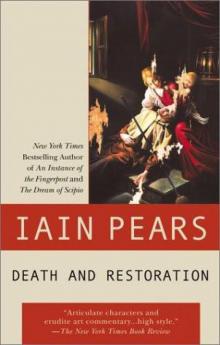 Death and Restoration
Death and Restoration The Raphael Affair
The Raphael Affair The Titian Committee
The Titian Committee The Immaculate Deception
The Immaculate Deception Giotto's hand
Giotto's hand The Portrait
The Portrait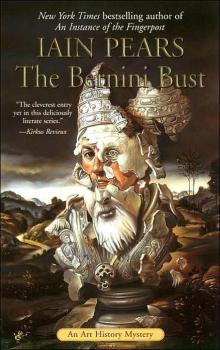 The Bernini Bust ja-3
The Bernini Bust ja-3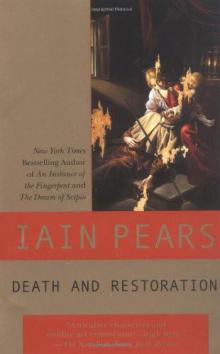 Death & Restoration ja-6
Death & Restoration ja-6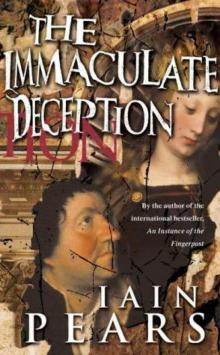 The Immaculate Deception ja-7
The Immaculate Deception ja-7